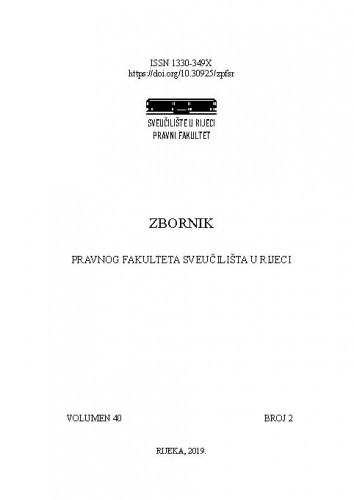Zaokret u primjeni sankcija Vijeća sigurnosti od općih, usmjerenih protiv država, prema ciljanim (pametnim) sankcijama usmjerenima izravno i isključivo protiv pojedinaca koje se dovodi u vezu s terorizmom, osim pozitivnih izazvao je i određene negativne učinke koji su doveli u pitanje zakonitost i pravednost ciljanih sankcija. Zbog nepostojanja odgovarajućega kontrolnog mehanizma u sustavu Ujedinjenih naroda koji bi pojedincima pogođenim sankcijama omogućio barem kvazisudsku kontrolu odluka Sankcijskog odbora o uvrštavanju njihova imena na, tzv. sankcijsku listu, u praksi je došlo do kršenja njihovih ljudskih prava, poput prava na pristup sudu, prava na pravično suđenje, prava na učinkovit pravni lijek. Autorica u radu analizira sankcijski režim Vijeća sigurnosti u borbi protiv terorizma koji je uveden Rezolucijom 1267 (1999); zatim se kroz relevantnu sudsku praksu prikazuju konkretne povrede ljudskih prava do kojih u praksi dolazi u provedbi sankcija Vijeća sigurnosti; analizira se uvođenje instituta Ombudsmana te se ocjenjuje uspješnost reformi u sankcijskom režimu kao iskoraka prema transparentnijoj i učinkovitijoj borbi protiv terorizma.; The turn in the implementation of the Security Council’s resolutions from general ones, directed against States, towards targeted (smart) sanctions directed exclusively against individuals linked with terrorism, has produced both positive as well as negative effects which have called in question the legality and justness of targeted sanctions. Due to the lack of an adequate control mechanism in the United Nations system, which would enable the individuals affected by sanctions at least a quasi-judicial review of the decisions adopted by the Sanctions Committee regarding their names being listed on the so called sanctions list, in reality those individuals are faced with violations of their fundamental human rights (e.g. the right to access to court, the right to a fair trial, the right to an effective remedy). The subject of this paper is the analysis of the Security Council’s sanction regime in the fight against terrorism which was introduced in resolution 1267 (1999). The author further analyzes international jurisprudence concerned with the mentioned violations of human rights in the implementation of the sanctions of the Security Council. Special emphasis is placed on the institution of Ombudsperson and its implications on the sanctions regime. The author concludes with the assessment of the efficacy of the reforms introduced in the sanctions regime as a step forward to the more transparent and effective fight against terrorism.
Sažetak

 Zbornik Pravnog fakulteta Sveučilišta u Rijeci : 40,2(2019) / glavni urednik Željko Bartulović.
Zbornik Pravnog fakulteta Sveučilišta u Rijeci : 40,2(2019) / glavni urednik Željko Bartulović.